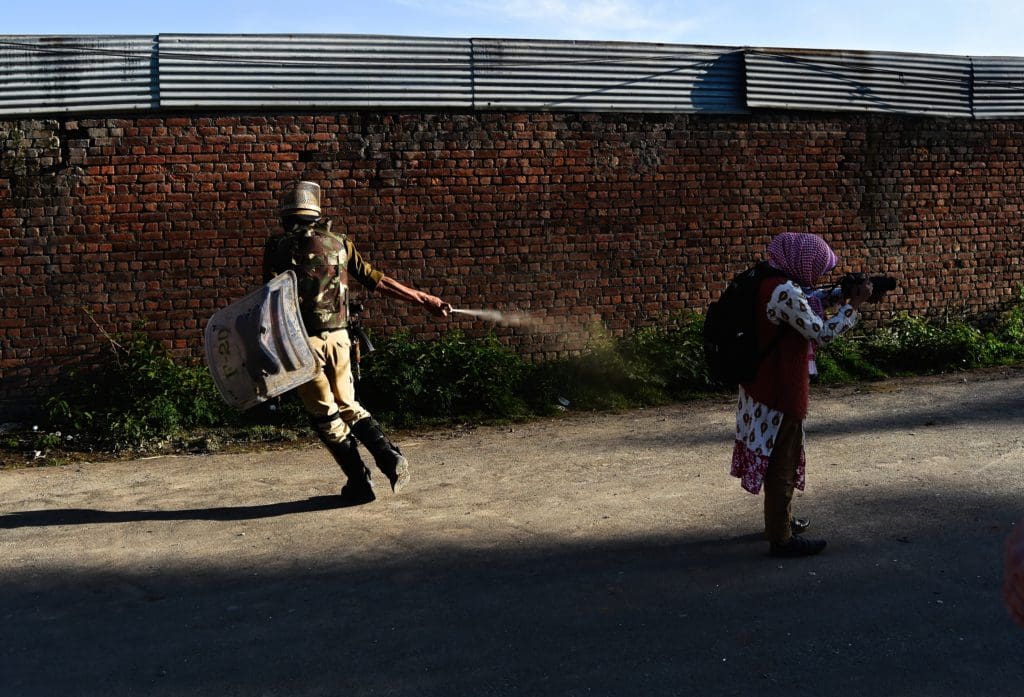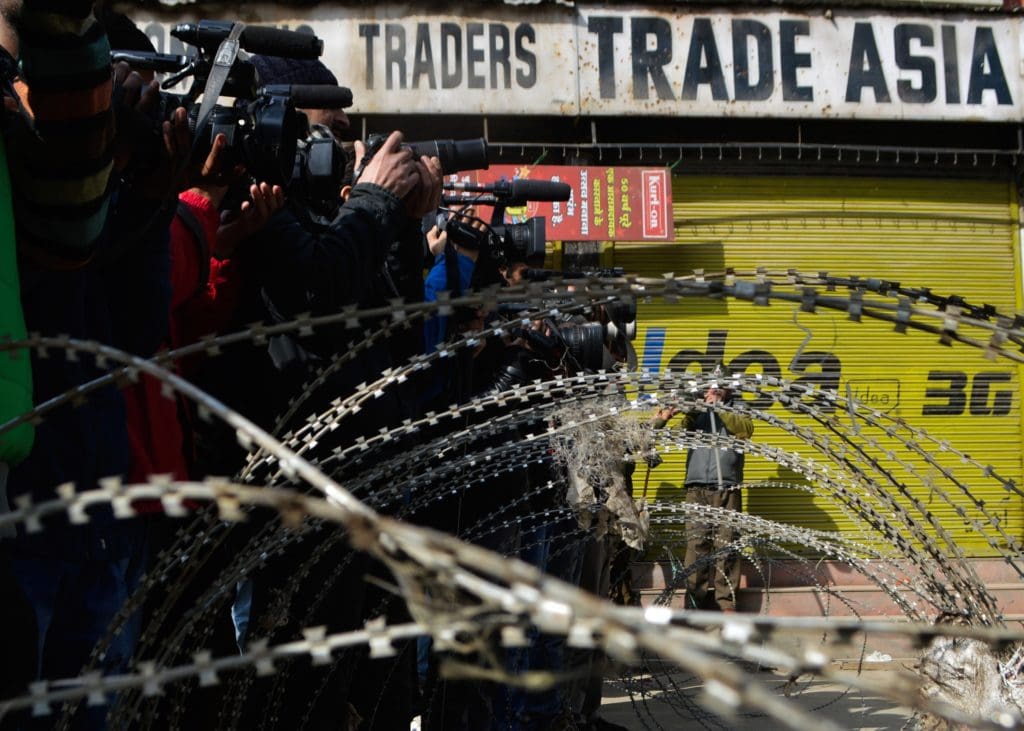
In the autumn of 2020, as the amber coloured leaves dropped from the mighty chinars of Kashmir, Zeeshan Nazir, a young boy in his 20’s, had to drop his childhood dream of becoming a Journalist. As a local university announced the results for admission to various post-graduation courses, Zeeshan secured a seat in two departments – Mass Communication and History. After discussing with his family and friends, he was advised not to pursue Journalism. “I was passionate about reporting and always thought of it as an ideal career choice but then, my parents were worried about the repressive state of Journalism in Kashmir,” Zeeshan said. “I could do nothing but follow their decision.”
Restrictions in the form of clampdowns, throttled internet and the new media policy have crippled the media industry of Kashmir. Rising intimidation and surveillance of journalists, post August 5, 2019, in the form of summons and stringent laws, is impacting the minds of budding journalists, many of whom are either shifting to other professions or choosing academics over hard-edge reporting.
Unlike Zeeshan, Aamir Shafi, a recent journalism grad from Government Degree College, Anantnag, decided to quit Journalism at his own will. After working with some local dailies during his bachelors, he has now applied for a degree in Information Technology at University of Kashmir. “I have observed the field from a close range and I know that if I report the stories that I want to do and the stories that matter, my safety would be compromised,” Aamir said. “It’s not that I am cowardly or I would succumb to the pressure, but I cannot visualise my family looking for me in jails,” adding that the news organisations also fear to publish the reports that could land them in trouble.
Accentuating the curbs on the freedom of press, Aamir said, “Journalism in Kashmir has become more risky since the abrogation of article 370. Journalists are being arrested and questioned not only for anti-government reports but also for simple social media posts.”
Sajad Gul, a freelance reporter based in Kashmir, has been frequently visiting the police station and district court in Sumbal Bandipora, for the past four months. This year, on February 9, Sajad, was booked for rioting by the police. At issue was a story on a demolition drive carried out by the tehsildar in Hajin area of north Kashmir’s Baramullah, where the locals had alleged that they were being ‘harassed and threatened’ by the official. “The story was based on facts and all angles were covered properly, but the tehslidar called and threatened me that he would end my career and put me behind bars,” Sajad said, describing the incident as sheer misuse of power by the revenue official. “The repercussions were such that FIR was filed against my four maternal uncles, only because of me.”


Sajad, who is currently pursuing his masters in Central University of Kashmir, believes this incident to be the biggest setback for him. He said that he is now fearful of reporting the truth and it has also affected his studies. “I do get a lot of worthy stories but my family has warned me not to stir up more risks. I am out on anticipatory bail and can be arrested anytime.”
“The authorities are making the reporters toe the line which, to a large extent, demotivates those who want to practice professional journalism,” said Waleed bin Owais, who recently completed his Masters of Science in computing from Qatar University. Back in 2018, Waleed topped the entrance examination for P.G Mass communication and Journalism at a Kashmir based media school, but opted out, only after few months of studying the course. “The unprecedented situation that emerged after August 2019 had a big impact on my decision to quit journalism. There was a complete ban on communications and it was near to impossible to report even for senior journalists, let alone starters like me,” Waleed said, who also used to work as an intern with a local daily at that time. “Journalists were being detained and charged under Public Safety Act. It was bleak all around.” Waleed flew to Doha during the lockdown and believes that his decision to move out was only to chalk up a prospective career.
In May, 2020, Jammu and Kashmir administration announced a 53 paged new media policy, which authorised the Department of Information and Public Relations (DIPR) to ‘examine the content of the print, electronic and other forms of media for fake news, plagiarism and unethical or anti-national activities,’ while issuing a warning that any individual or group that peddles fake news and indulges in anti-national activities shall be disempanelled besides being proceeded under law.
Journalists based in Kashmir have time and again criticised this policy and termed it as ‘undemocratic’ and ‘vicious’. “The policy is a clear attempt to muzzle the press and prevent them from reporting the truth,” said Badar Bashir, a feature writer at a local web portal, adding that the new media policy has forced local journalists to self-censor. “Self-censorship is incorporated to steer clear of harassment of the authorities. Reporters have become a blip on the radar of the powerful and get abused for writing the truth.” He believes that a journalist witnessing injustice and being unable to write about it takes the nobility away from journalism and creates a scheme of irrelevance for this profession.
An editor of a Kashmir based publication, wishing anonymity, said that, although his newsroom witnesses the influx of new comers, many of them discontinue working after few months. “Lot of students come to us for internship or freelancing, but when their bold and conflict related story ideas get rejected, they feel demotivated. We can’t expose them to the menace at the onset of their careers, but these youngsters don’t want to settle for less.”
Contrarily, Dr. Ruheela Hassan, head of the department of Journalism, Islamic University of Science and Technology (IUST), believes that the number of institutions offering mass communication as a course in Kashmir has increased in the recent years, thus multiplying the number of students enrolling for the programme. “There was a time when only University of Kashmir used to offer this course, but now we have IUST, Central University, Cluster University and some colleges also who teach this subject. Some students also prefer to study in outside colleges,” she said.
However, she recognizes the financial risk as the prime factor responsible for the gap between classroom and the workplace. “The political climate in Kashmir makes it more difficult for journalists to report fearlessly. Young journalists facing troubles at the hands of forces is undeniably discouraging, but in addition to this, financial insecurity has pushed many to switch to other professions.”
Dr. Ruheela believes that more than the student trainees, it is the freelancers or independent journalists who face the real brunt of intimidations. “During the initial years everything looks fancy to them and once they in the field they get to know the real struggles.”
Six years back, in 2014, when Faheem Mir, a journalism graduate from Rafiabad Bramaullah, was beaten by forces while covering a political rally, he did not lose hope and continued to work for a news weekly. But later, he realised that he cannot make a decent living with the little wages he used to get. He now runs a shop. “We risk our lives to report the stories but what we get is peanuts. And if the situation worsens, like the 2019 clampdown, we are laid off,” Faheem says.
Faheem says that despite working hard on news stories, he used to depend on his family for logistic support. “It was impossible for me to continue with reporting. After all, survival matters. My shop is five times more lucrative than my earlier job.”
Irfan Ahmad Malik, the first journalist to be detained after the centre revoked the constitutional autonomy of J&K, also believes that the state intimidation and meagre salaries is psychologically impacting the aspiring journalists. “When a journalist completes his degree, he has a lot of dreams to work professionally in the field, and highlight the violations that the state might not want to get published. And when journalists are being targeted for little reasons, it demoralizes them and they start looking for alternatives,” he said.
He said that journalists in Kashmir live on the edge of a sword, on one side is the fear of intimidations and on the other is the struggle to sustain on the low wages. Besides this, Irfan feels that ‘lack of organisational support system, public humiliation and the presence of self-styled unprofessional reporters in the field’ are some other factors responsible for the shift.
“Journalists are facing a lot of heat not only at the hands of the authorities but also from the people, because right now the Kashmir based organisations also refrain from publishing the ground zero stories. This has attracted a lot of criticism from the public,” Irfan who writes for various local and national media organisations, said. “People accuse us of changing the real narratives.”
Concurring with Irfan, Samreena Nazir, a female journalist, said that any person with a mic, hand held camera and a social media handle considers himself a journalist in Kashmir. “They have occupied the places of real reporters, especially at districts levels. With no knowledge of media ethics, they malign our image,” she said. “No professional degree holder would ever want to be tagged with these unscrupulous folks.”
After carefully weighing the pros and cons of continuing her career as a full-time reporter in Kashmir, Samreena, a post graduate in Journalism, is planning to earn a Ph.D. “I have started to like the idea of becoming a researcher or academics than being in a precarious profession,” she said.
Farzana Nisar is an independent journalist based in Kashmir.



